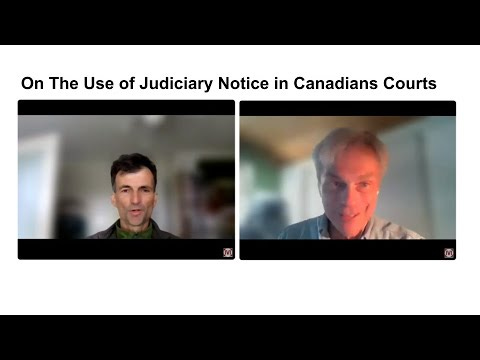On The Use of Judiciary Notice in Canadian Courts - Interview with Chuck Black (VIDEO)
Uploaded to @IVIM YouTube channel
UPDATES:
See also: Historical Legal Breakthrough related to the use of Judicial Notice in Canadian Court in COVID vaccine related cases:
Have you ever wondered why many (but not all) COVID-19 cases were lost in Canadian courts? This can be due to the concept of Judicial Notice, which allows courts to treat information published by the government as "notoriously known," meaning it is accepted as evidence "without challenge." This applies to topics such as "climate change," "systemic racism," "fifth wave feminism," and "COVID-19 vaccine safety and efficacy." I learned about this from Chuck Black, a former reporter for the Globe and Mail, CBC, National Post, CTV, Global, and others, during his presentations at the Canadian Freedom Leaders Forum.
I found this topic under-explored yet significantly important, so I decided to invite Chuck for a separate discussion entirely dedicated to this subject. Here is the recording of our Zoom discussion. The chat from the session is provided below, along with additional information to help you better understand the topic. This will benefit anyone interested in learning more about the use of Judicial Notice in Canadian courts, avoiding common errors, and effectively utilizing it if you ever go to court.
If you find this discussion useful, please share it. Note that it is available on the IVIM YouTube channel. I want to ensure that people who don't watch alternative platforms can also join and participate in this important discussion, which I hope they will.
Finally, please note that we plan to have a follow-up discussion with Chuck, as some questions and issues remain open. If you have a question or comment on this subject or for Chuck, please post it below in the comments.
The opinions expressed here are those of the presenter only. You can read the full article on the subject at Chuck’s substack: https://chuckblack.substack.com/p/the-historic-concept-of-judicial
Watch the discussion by clicking on image below
Definitions:
https://www.irb-cisr.gc.ca/en/legal-policy/legal-concepts/Pages/EvidPreu10.aspx
10. Judicial notice and specialized knowledge
10.1 Judicial notice
Facts that can be “judicially noticed” are facts so notorious or generally accepted as not to be the subject of debate among reasonable persons. Judicial notice is invoked to relieve parties from having to prove facts that are not in dispute. Thus, when judicial notice is taken of a fact, no formal evidence of that fact must be introduced at the trial or hearing.
Examples of use:
Zoom Chat
Evidence Act - https://canlii.ca/t/555m2
25 - Copies of statutes, etc.
25 Copies of statutes, official gazettes, ordinances, regulations, proclamations, journals, orders, appointments to office, notices thereof and other public documents purporting to be published by or under the authority of the Parliament of the United Kingdom, or of the Imperial Government or by or under the authority of the government or of any legislative body of any dominion, commonwealth, state, province, colony, territory or possession within the Queen’s dominions, shall be admitted in evidence to prove the contents thereof. R.S.O. 1990, c. E.23, s. 25; 2020, c. 34, Sched. 13, s. 3 (1).
J.N. v. C.G., 2023 ONCA 77 (CanLII) – Court of Appeals, father now wins, kids to be vaccinated https://canlii.ca/t/jv9c5
[25] Section 25 of the Evidence Act provides that:
Copies of statutes, official gazettes, ordinances, regulations, proclamations, journals, orders, appointments to office, notices thereof and other public documents purporting to be published by or under the authority of the Parliament of the United Kingdom, or of the Imperial Government or by or under the authority of the government or of any legislative body of any dominion, commonwealth, state, province, colony, territory or possession with the Queen’s dominions, shall be admitted in evidence to prove the contents thereof.
[26] Under the public document exception to the hearsay rule, reports of public officials are admissible for the truth of their contents: R. v. P.(A.) (1996), 1996 CanLII 871 (ON CA), 109 C.C.C. (3d) 385 (Ont. C.A.); A.C. v. L.L., 2021 ONSC 6530. While this speaks only to admissibility, and not to what weight a judge must ultimately assign to it, it is important to understand why s. 25 exists and why there is a common-law exception, which speaks not only to the inherent reliability and trustworthiness of records and reports generated by public officials, but also to avoid the inconvenience of public officials having to be present in court to prove them. Consider this passage from P.(A.), where Laskin J.A. wrote, at pp. 389-390, that:
At common law statements made in public documents are admissible as an exception to the rule against hearsay evidence. This exception is “founded upon the belief that public officers will perform their tasks properly, carefully, and honestly”: Sopinka et al. The Law of Evidence in Canada (1992), p. 231.
[27] Rand J. explained the rationale in Finestone v. The Queen (1953), 1953 CanLII 81 (SCC), 107 C.C.C. 93 (S.C.C.), at p. 95:
The grounds for this exception to the hearsay rule are the inconvenience of the ordinary modes of proof and the trustworthiness of the entry arising from the duty, and that they apply much more forcefully in the complex governmental functions of today is beyond controversy [Emphasis added].




Good piece, except that, officially I was a freelancer who got published in the Globe and Mail, CBC, National Post, CTV, Global, and others. Other then that, its a good post.